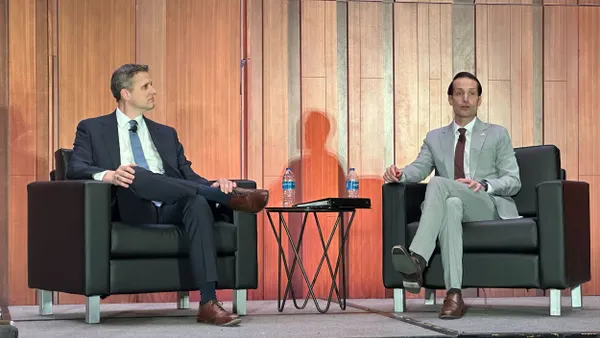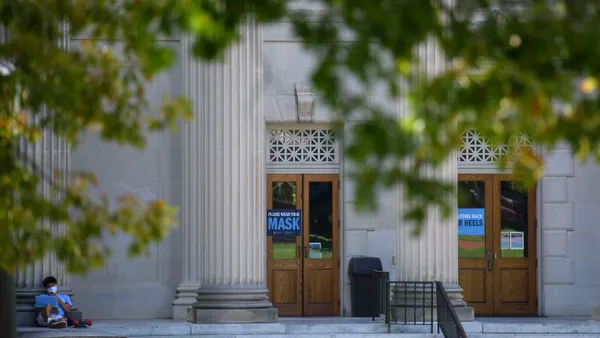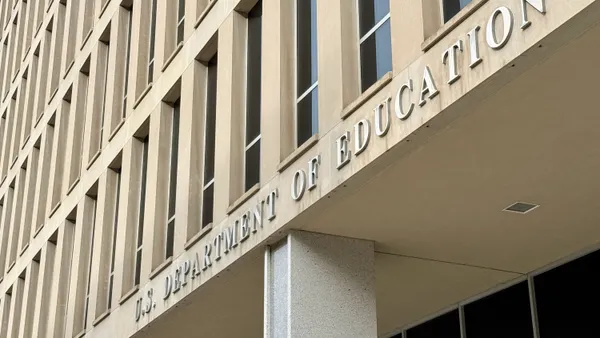Dive Brief:
- A federal judge on Thursday granted a preliminary injunction blocking the U.S. Department of Energy from instituting a 15% cap on reimbursement for colleges’ indirect research costs.
- A group of universities and higher education associations sued the department in April, alleging it had overstepped its authority in implementing the policy and applying the change retroactively by terminating grants with reimbursement rates above the cap.
- In her ruling last week, U.S. District Judge Allison Burroughs agreed with the plaintiffs' arguments and said they are likely to succeed in proving the Energy Department's funding cap is "arbitrary and capricious” and violates federal law.
Dive Insight:
Burroughs had temporarily blocked the Energy Department's policy days after the plaintiffs filed suit. Thursday’s ruling extends that freeze, banning the agency from applying its rate cap policy to any colleges until she orders otherwise.
Despite the government's mounting legal losses, the Trump administration is not letting up on efforts to limit research-related funding to colleges.
The U.S. Department of Defense announced Wednesday it would enact its own 15% indirect research cap. The agency estimated that the change will reduce outgoing funding by $900 million annually.
"We will not stop at new grants," U.S. Secretary of Defense Pete Hegseth said in the memo. "Meaningful savings can also be achieved by revisiting the terms of existing awards to institutions of higher education."
Hegseth directed agency officials to terminate and reissue previously -awarded grants under the new terms if colleges do not agree to them.
COGR, an association for research universities and institutes and medical centers, criticized the Defense Department proposal as a cut to national security.
"Under the Trump Administration, DOD is the fourth federal agency to impose a 15% cap on research indirect cost reimbursement rates. The courts continue to halt implementation of these harmful policies," Matt Owens, president of COGR, said in a statement Friday. "It’s time the Administration stop issuing misguided policies and start working in good faith with the academic research community."
The Energy Department announced its ceiling on indirect research costs on April 11, following in the footsteps of the National Institutes of Health, which had announced a similar one in February. A federal judge in early April struck down the NIH cap.
In announcing the Energy Department's version, U.S. Secretary of Energy Chris Wright said the change would ensure federal funding efficiently supported research versus “administrative costs and facility upgrades.”
The department, which awards about $2.5 billion annually to over 300 colleges, estimated the cuts would halt $405 million in indirect cost funding annually.
The plaintiffs — including groups like the American Council on Education and the Association of American Universities and colleges like Princeton and Cornell universities — sued three days after the Energy Department's announcement.
In addition to alleging that the policy is unlawful, the lawsuit argues the funding change threatens the country's scientific and medical research advancement. Prior to the cap, many of the college plaintiffs had indirect research reimbursement caps north of 50%, according to court documents. Princeton, for example, negotiated an indirect cost rate of 62% for fiscal year 2024.
In her ruling, Burroughs said the agency needed to have a strong underlying rationale to change its negotiated rates with colleges.
But the department's 15% cap policy, "even read generously, offers very little by way of explanation or justification for the decision to so suddenly and drastically limit reimbursement for indirect costs," she wrote.
The judge acknowledged that the Energy Department might have information that could support the new cap.
"If such data exists, however, it was not made public or otherwise articulated," she wrote.
The plaintiffs' lawsuit called the Energy Department's policy a "virtual carbon copy” of the NIH's. In permanently blocking that cap, U.S. District Judge Angel Kelley ruled that NIH enacted it without following proper procedures and violated prohibitions against applying new policies retroactively.
“DOE’s action is unlawful for most of the same reasons and, indeed, it is especially egregious because DOE has not even attempted to address many of the flaws the district court found with NIH’s unlawful policy,” the plaintiffs in the Energy Department lawsuit said.
Burroughs last week agreed with Kelley's decision, calling it "a well-reasoned opinion." NIH has appealed that ruling.
Earlier this month, the National Science Foundation similarly announced a 15% cap on colleges’ indirect research costs. Much like NIH and the Energy Department, colleges and higher ed groups sued the NSF over the change days later.















